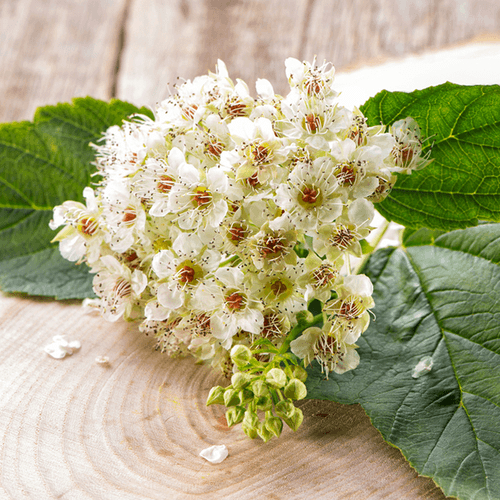
Black haw
Scientific names: Viburnum prunifolium, Viburnum lentago, Viburnum rufidulum
Family: Adoxaceae/Viburnaceae
Alternate names: Blackhaw, Nanny Bush, Southern Black Haw, Stag Bush, Viburno, Viburno Americano, Viburnum, Viorne Américaine, Viorne à Feuilles de Prunier, Viorne à Manchettes
Actions: Post-menopausal symptoms, Uterine function
Background
Black haw (Viburnum prunifolium) is a shrub native to the woodlands of southern North America. Its root bark has been traditionally used as medicine.
Black haw contains a chemical that might relax the uterus.
People use black haw for menstrual cramps, asthma, diarrhea, labor pain, and many other conditions, but there is no good scientific evidence to support these uses.
Black haw contains a chemical that might relax the uterus.
People use black haw for menstrual cramps, asthma, diarrhea, labor pain, and many other conditions, but there is no good scientific evidence to support these uses.
Safety Safety definitions
When taken by mouth: Black haw stem bark is commonly consumed in foods. Black haw root bark is possibly safe when taken as a medicine.
Breast-feeding: There isn't enough reliable information to know if black haw is safe to use when breast-feeding. Stay on the safe side and avoid use.
Aspirin allergy: Black haw contains chemicals called salicylates. These salicylates could trigger an allergic reaction in people with asthma or aspirin allergies.
Kidney stones: Because black haw contains oxalic acid. It might increase stone formation in people with a history of kidney stones.
Special Precautions & Warnings:
Pregnancy: It is possibly unsafe to use black haw when pregnant. It might affect the uterus.Breast-feeding: There isn't enough reliable information to know if black haw is safe to use when breast-feeding. Stay on the safe side and avoid use.
Aspirin allergy: Black haw contains chemicals called salicylates. These salicylates could trigger an allergic reaction in people with asthma or aspirin allergies.
Kidney stones: Because black haw contains oxalic acid. It might increase stone formation in people with a history of kidney stones.
Effectiveness
Effective Effectiveness definitions
There is interest in using black haw for a number of purposes, but there isn't enough reliable information to say whether it might be helpful.
Dosing & administration
Traditionally, black haw has been prepared as a tea or in tinctures. Speak with a healthcare provider to find out what type of product and dose might be best for a specific condition.
Interactions with pharmaceuticals
It is not known if Black Haw interacts with any medicines. Before taking Black Haw, talk with your healthcare professional if you take any medications.
Interactions with herbs & supplements
Calcium: Black haw contains oxalic acid (oxalate), which can decrease the amount of calcium the body absorbs from supplements.
Iron: Black haw contains oxalic acid (oxalate), which can decrease the amount of iron the body absorbs from supplements.
Zinc: Black haw contains oxalic acid (oxalate), which can decrease the amount of zinc the body absorbs from supplements.
Iron: Black haw contains oxalic acid (oxalate), which can decrease the amount of iron the body absorbs from supplements.
Zinc: Black haw contains oxalic acid (oxalate), which can decrease the amount of zinc the body absorbs from supplements.
Interactions with foods
Black haw contains oxalic acid (oxalate), which can decrease the amount of calcium, iron, and zinc the body absorbs from foods.
vital.ly has licensed monographs from TRC Healthcare.
This monograph was last reviewed on 26/08/2023 10:00:00 and last updated on 31/10/2020 02:14:59. Monographs are reviewed and/or updated multiple times per month and at least once per year.
Natural Medicines disclaims any responsibility related to medical consequences of using any medical product. Effort is made to ensure that the information contained in this monograph is accurate at the time it was published. Consumers and medical professionals who consult this monograph are cautioned that any medical or product related decision is the sole responsibility of the consumer and/or the health care professional. A legal License Agreement sets limitations on downloading, storing, or printing content from this Database. No reproduction of this monograph or any content from this Database is permitted without written permission from the publisher. It is unlawful to download, store, or distribute content from this site.




